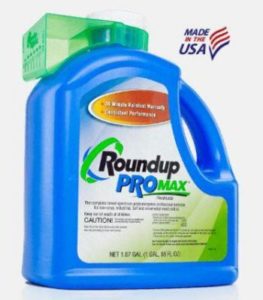Monsanto Helped Write Cancer Studies on Roundup, Emails Indicate
JUSTICE, 27 Mar 2017
Allen Cone | UPI – TRANSCEND Media Service

Roundup, made by Monsanto, is the best-selling weed killer in the world. Farmers and others have filed a lawsuit in federal court in San Francisco, claiming Monsanto failed to warn that exposure to Roundup could cause non-Hodgkin’s lymphoma, a type of cancer.
Photo courtesy of Monstanto
15 Mar 2017 – Monsanto ghostwrote studies on the herbicide Roundup for the Environmental Protection Agency, documents unsealed in a federal court case seem to show.
Farmers and others are suing chemical company Monsanto, alleging that the company failed to warn them that its glyphosate-based week killer can cause non-Hodgkin’s lymphoma.
In company emails made public Tuesday in federal court in San Francisco, Monsanto executives discuss ghostwriting research papers on Roundup, the company’s best-selling product, that would be signed by scientists. Two papers on Roundup were eventually published, one in 2000 and one in 2013.
The documents, which were unsealed by U.S. District Judge Vince Chhabria, include Monsanto’s internal emails and also emails between the company and federal regulators.
In one email, a Monsanto scientist, Dr. William Heydens, mentioned he could write the 2013 report.
“We would be keeping the cost down by us doing the writing and they would just edit & sign their names so to speak,” Heydens wrote, noting it was done in 2000.
In a blog post, the company said Heydens’ contributions in 2000 were fully disclosed in the report’s acknowledgments section, and said the paper underwent a rigorous peer review process before being published. The blog did not address the 2013 report.
“Plaintiffs’ attorneys have cherry picked a single email – out of more than 10 million pages of documents produced – to allege that Monsanto scientists ghostwrote” the report, the company said on the blog.
Jess Rowland, an EPA official in charge of evaluating whether glyphosate, the main ingredient in Roundup, causes cancer, relied on the reports to conclude that glyphosate shouldn’t be classified as carcinogenic.
In an April 2015 phone conversation with a Monsanto executive, he said he could kill an investigation, according to the court documents.
“If I can kill this I should get a medal,” Rowland told a Monsanto regulatory affairs manager, Dan Jenkins, who related the conversation to his colleagues in an email.
The company, according to the filing, sought Rowland’s help stopping an investigation of glyphosate by a separate office, the Agency for Toxic Substances and Disease Registry.
Rowland, who retired last year, is not a defendant in the lawsuit.
Scott Partridge, Monsanto vice president of global strategy, told Bloomberg it would be “remarkable” if Monsanto could influence the EPA. He described the emails as “a natural flow of information” between the company and the EPA.
The company also defended glyphosate.
“The allegation that glyphosate can cause cancer in humans is inconsistent with decades of comprehensive safety reviews by the leading regulatory authorities around the world,” Monsanto said in a statement.
On March 10, the company lost a court case to keep glyphosate off California’s public list of cancer-causing chemicals.
Tim Litzenburg, one of the lawyers suing Monsanto, said the cache of unsealed documents “represents a huge development in public health.”
DISCLAIMER: The statements, views and opinions expressed in pieces republished here are solely those of the authors and do not necessarily represent those of TMS. In accordance with title 17 U.S.C. section 107, this material is distributed without profit to those who have expressed a prior interest in receiving the included information for research and educational purposes. TMS has no affiliation whatsoever with the originator of this article nor is TMS endorsed or sponsored by the originator. “GO TO ORIGINAL” links are provided as a convenience to our readers and allow for verification of authenticity. However, as originating pages are often updated by their originating host sites, the versions posted may not match the versions our readers view when clicking the “GO TO ORIGINAL” links. This site contains copyrighted material the use of which has not always been specifically authorized by the copyright owner. We are making such material available in our efforts to advance understanding of environmental, political, human rights, economic, democracy, scientific, and social justice issues, etc. We believe this constitutes a ‘fair use’ of any such copyrighted material as provided for in section 107 of the US Copyright Law. In accordance with Title 17 U.S.C. Section 107, the material on this site is distributed without profit to those who have expressed a prior interest in receiving the included information for research and educational purposes. For more information go to: http://www.law.cornell.edu/uscode/17/107.shtml. If you wish to use copyrighted material from this site for purposes of your own that go beyond ‘fair use’, you must obtain permission from the copyright owner.